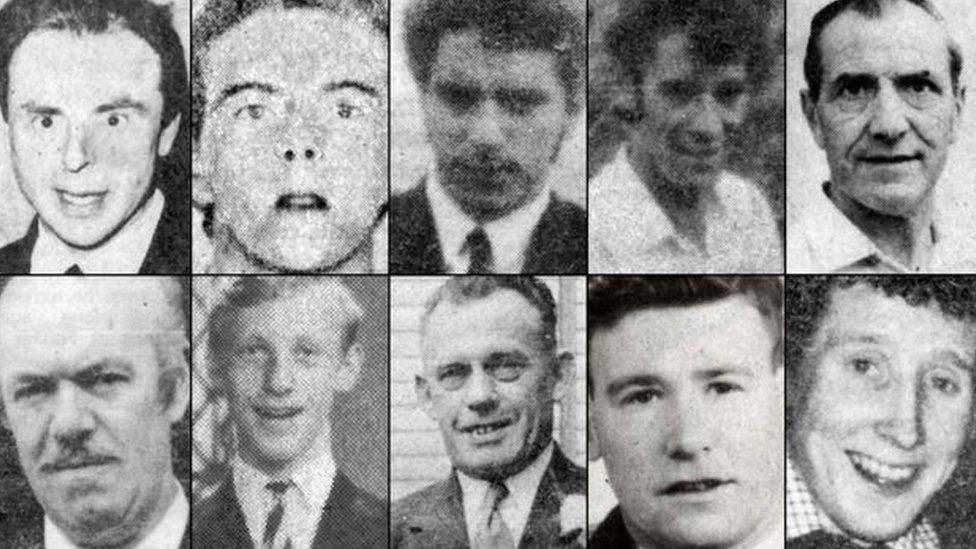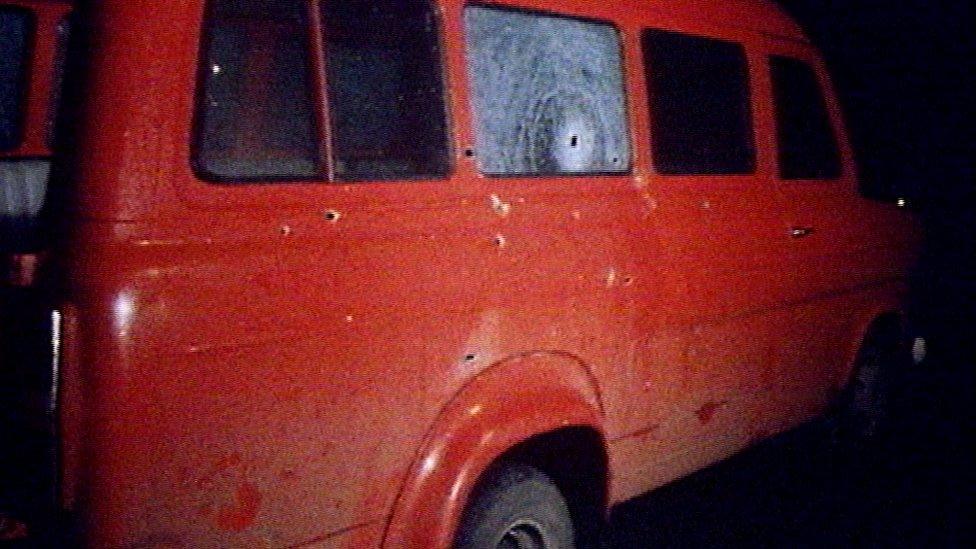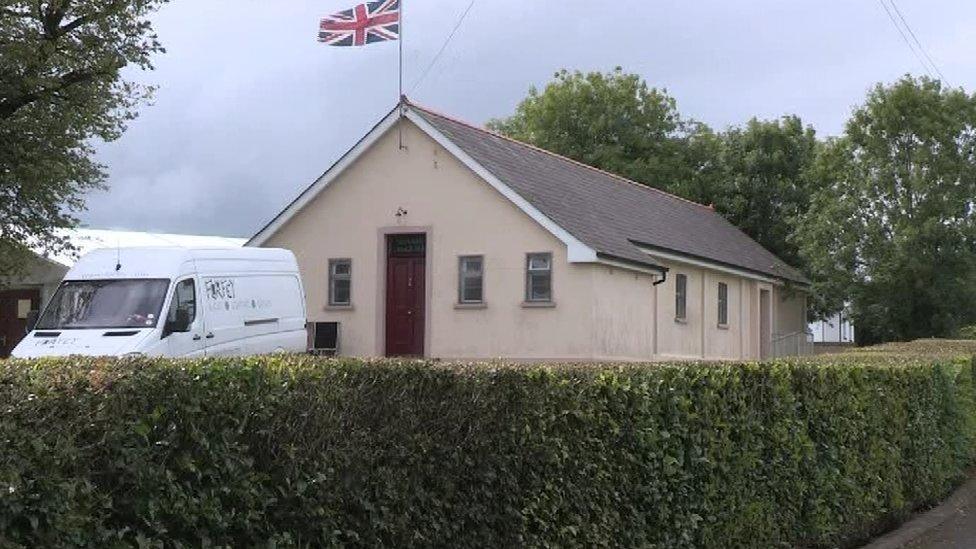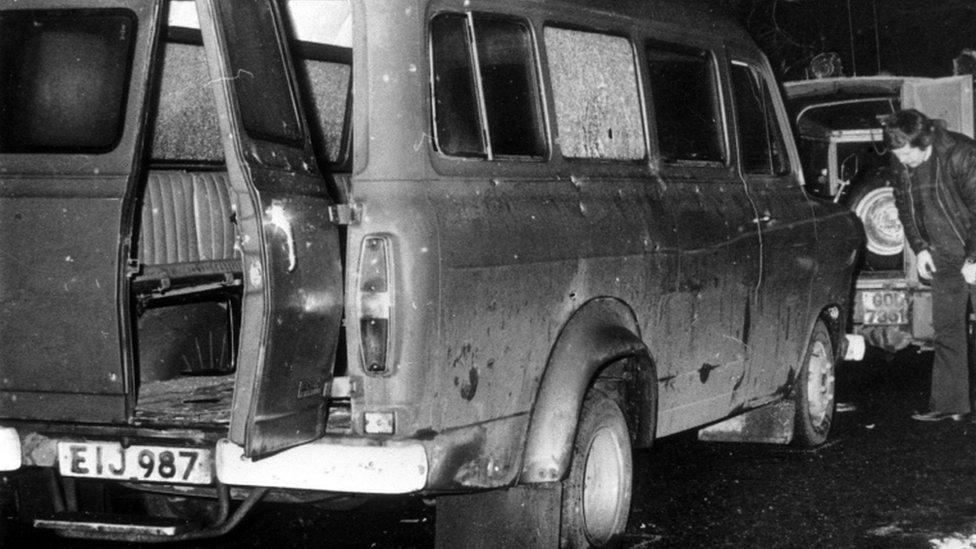Kingsmills detective cannot explain failures
- Published

Ten workmen, aged from 19 to 58, were murdered by the IRA at Kingsmills in 1976
An inquest into the Kingsmills murders has heard that RUC Special Branch denied police detectives permission to question a number of prime suspects.
Ten Protestant men were shot by the IRA in County Armagh in 1976, in an attack known as the Kingsmills massacre.
The inquest has been told the original Royal Ulster Constabulary (RUC) investigation was short of manpower.
The detective who led the investigation has faced questions over failures to interview potentially vital witnesses.
The Kingsmills victims were travelling home from their jobs in a textile factory when an IRA gang ambushed their minibus.
The gunmen ordered the only Catholic man on board the bus to leave the scene, before lining up the Protestants and opening fire.
More than 150 bullets were fired at the defenceless men - 10 died and one survived but was very seriously injured.
'Gruesome scene'
The RUC's investigation was led by Det Ch Insp James Mitchell, an experienced officer who had joined the police force in 1959.
He rose from the rank of constable to a leading position in the RUC's Criminal Investigation Department, investigating some of Northern Ireland's most grisly murders.
Giving evidence to the inquest in Belfast, Mr Mitchell said that he arrived at the scene of the murders within 20 minutes of receiving the emergency call.
He was greeted with what he described in court as "one of the most gruesome murder scenes of the Troubles".

The victims were shot after IRA gunmen stopped their bus as they travelled home from work
Mr Mitchell said that while responsibility for the attack was originally claimed by a group calling itself the South Armagh Republican Action Force, he had no doubt it had been carried out by Provisional IRA members from north County Louth and south County Armagh.
The former officer faced questions over the RUC's handling of the investigation - including issues that had been raised in a 2011 review of the case by the Historical Enquiries Team.
Mr Mitchell told the court that he required between 40 and 50 detectives to work on such a huge murder investigation, but the maximum he was given was 12 detectives and two sergeants.
Denied access
He said that from ballistics reports, the RUC knew that 11 weapons had been used in the Kingsmills attack - some of which had also been used in a string of other IRA murders.
These included the IRA gun attack on Tullyvallen Orange hall in 1975, which led to the deaths of five men.

One of the guns used at Kingsmills had also been used to murder five men at Tullyvallen Orange hall in September 1975
A barrister acting for some of the families of the Kingsmills victims questioned Mr Mitchell about claims that the RUC failed to interview a number of witnesses.
The former officer confirmed that the RUC had planned to interview a suspected IRA man but RUC Special Branch officers denied them access to the suspect.
The court also heard that the Ulster Defence Regiment (UDR) had reported a sighting of a hijacked van - which was believed to have been used by the Kingsmills gunmen - parked outside the home of another suspected IRA member.
Mr Mitchell was asked why that man not brought in for questioning but he was unable to explain the decision.
The former detective was also asked why his officers had apparently failed to respond to a number of entries in the RUC's serious incident log.

The minibus the victims had been travelling home in was covered in bullet holes
One entry related to a phone call from a young woman who told police she saw a large group of men behind a shop in County Armagh on the afternoon of the Kingmills attack.
The court heard she was also able to describe the hijacked van used by the gunmen.
Mr Mitchell said he could not say why her report did not appear to have been acted on by the RUC.
Catholic survivor
The inquest also heard that the RUC failed to trace or question several eyewitnesses who came across the scene in the aftermath of the attack.
These included three men described in court as "potentially important witnesses" and a woman who gave a lift to the Catholic man who the gunmen had ordered to flee the scene.
The court heard that the woman, who had been driving a small car, brought the man back to his home after the shootings.
However, she was never identified let alone interviewed to check if she could help with the investigation.
Speaking outside court, Colin Wharton - who lost his brother in the Kingsmills attack - described the failures in the RUC investigation as "staggering".
- Published23 May 2017

- Published22 May 2017
